The seven-member Metro Council will decide on Thursday whether or not to approve the creation of new off-road trails near Portland.
If their North Tualatin Mountains Trail Access Plan is passed it will set into motion the development of over six miles of new off-road routes open to bicycles. This plan would be a major milestone because the first phase of trail construction (at Burlington) will happen just 10 miles north of downtown Portland and 2.25 miles of those trails will be built specifically for bicycle riding.
“Bicycle-optimized trails,” to use Metro’s term (a.k.a. singletrack) are rare and coveted for many Portlanders who don’t want to drive a minimum of 45 minutes just to ride. Forest Park only has 1/3 mile of singletrack and Powell Butte (about 13 miles east of downtown Portland) is small and offers only limited options. Off-road cycling advocates have been trying for years (without much success) to improve bike access at Forest Park and more recently at River View Natural Area in the southwest hills. Both times the Portland Parks and Recreation Bureau has pulled the rug out from under them in favor of the status quo.
Hopeful that Metro (our region’s metropolitan planning agency) won’t play the same games, bike advocates have spent the last two years working with them to come up with an access plan for the 1,300 acres and four parcels the agency owns in the North Tualatin Mountains. From the outset Metro has made it clear that cycling trails would be an option. And at the end of last year the North Tualatin Mountains Stakeholder Advisory Committee recommended over 10 miles of bike trails, hiking trails, and gravel roads on two of four of the parcels.
In a presentation during the public hearing last week Metro Conservation Program Director Dan Moeller told council members that one of the goals of the plan — in addition to preserving wildlife habitat — was, “to create a fun safe experience for people who want to come experience nature, and for some that means riding a bike.”
Moeller, along with Project Manager Olena Turula and Science Manager Jonathan Soll made a strong case for the plan.
For his part, Soll directly addressed the main concerns brought up by people who oppose it.
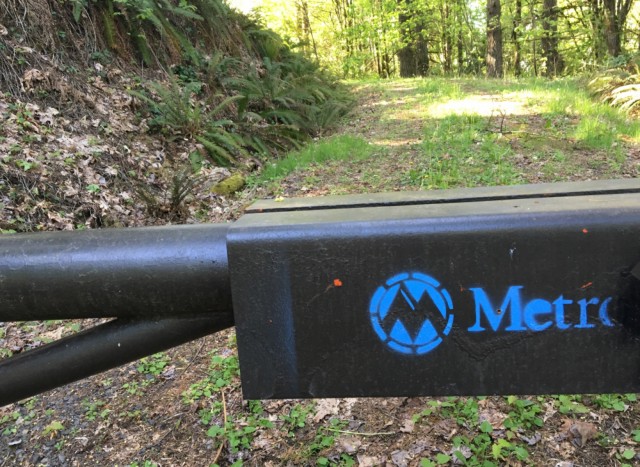
On the call for more wildlife studies — a demand being made by a group of (mostly) Tualatin Mountain residents who strongly oppose the plan — Soll said, “As a conservation biologist I love data, but I also know that collecting more data doesn’t necessarily improve decision making.”
“We do not see narrow, well-designed trails as an existential threat to a species that can cross over Highway 30 and people’s backyards.”
— Jonathan Soll, Metro Science Manager
While acknowledging that the project will have some impacts, Soll said Metro will “practice sound management.” Soll even poked holes in concerns about how the trail plan would impact red-legged frogs, a sensitive species. “We do not see narrow, well-designed trails as an existential threat to a species that can cross over Highway 30 and people’s backyards… It would be better to invest in habitat management than more research.”
People who oppose the plan also say new trails should not be built in areas where elk are present. Their lobbying already resulted in Metro removing a key, 2.7 mile trail in the McCarthy Creek parcel that had been recommended by the advisory committee (and that many supporters of the plan now want reinstated). But Soll said Metro’s plan will actually improve elk habitat. “While some trails are being constructed we are also closing miles of old logging roads and the areas with the most elk have been largely excluded from new access,” he said.
Soll also punched holes in claims that the plan will destroy a the “Forest Park corridor” that some feel is an essential link between the west hills and the Pacific Coast Range. “There is simply no widely accepted science that suggests animals use corridors as humans think of them,” Soll said.
When the hearing opened to public testimony a total of 20 people spoke. 12 of them supported the plan and eight voiced opposition (and at least five of those eight live directly adjacent to areas where new trails will be built).
Portland resident Spencer Bushnell said people who oppose the plan have used unfair and insulting labels against trail advocates. “They report we want an ‘adventure park,’ but they couldn’t be further from the truth. We love nature, we want to preserve it, we want to be a part of it.” Bushnell said he wants Metro to reinstate the trail in the McCarthy Creek parcel that was removed after a citizen lobbying effort. “The ODFW [Oregon Department of Fish & Wildlife] says the elk population is not impacted by human activity, so why are we not allowing human access to this small section of the forest?”
Advertisement
Newberry Road resident Brian Whitekamp said he doesn’t support the plan said “Bikers already have all of Leif Erikson Road and Mt. Hood” to ride on and that, “Adding special trails for bikes really complicates trail needs.”
Plan supporter Ron Strasser said we need close-in bike trail opportunities because not everyone can afford to drive to Mt. Hood.
“Where’s the tipping point? There haven’t been enough studies to know… That forest is going to be completely destroyed.”
— Hank McCurdy, Tualatin Wildlife Alliance
Hank McCurdy, the leader of the Tualatin Wildlife Alliance who is organizing the opposition to the plan, said his group wants to “Wring the politics out of it.” McCurdy wants a comprehensive baseline study of the existing conditions before any new access moves forward. “Where’s the tipping point? There haven’t been enough studies to know… That forest is going to be completely destroyed.” And then he made what seemed like a veiled political threat to the councilors: “You’ve got a levy coming up… This [opposition] is just the tip of the iceberg.”
Another nearby resident, Bonnie Leiser, said she’s worried the area would become “extremely popular” with new visitors if the plan is adopted. “The parking lot could overflow creating significant danger,” she warned, “And McNamee [the street she lives on] could get a lot more traffic and the increased traffic could put families living on McNamee Road in increased danger by people not accustomed to driving on mountain roads.”
Not everyone who lives adjacent to the Tualatin Mountains is opposed to the plan.
April Guitierrez, who lives off McNamee Road praised Metro for allowing horseback riding and spoke against many of her neighbors who are vehemently opposed to the plan. “Some neighbors are concerned it’ll bring traffic, pollution, and noise to our neighborhood. These lands area a public resource where people should be free to experience nature in their favorite ways.” Guitierrez shared her experiences in the Canadian Rockies where huge elk herds exist in areas filled with development and tourists.
“It’s not fair to deny access to these places simply because a few people who live near the area don’t want visitors.”
— Susan Watt, nearby resident
And Susan Watt, who has lived adjacent to the Ennis Creek parcel [which isn’t being developed] for 25 years, said she supports the plan because her children grew up biking and walking on mountain trails and she wants others to have that experience.
Watt was also one of several people who asked Metro to reinstate the 2.7 mile trail in McCarthy Creek that Metro removed due to objections by McCurdy’s group. Suzanne Marco from southeast Portland said she was “dismayed” that Metro removed the trail. “I’m afraid that a few homeowners that live in this area have negatively affected Metro’s plan,” she said. “It’s not fair to deny access to these places simply because a few people who live near the area don’t want visitors.”
Jenna Powell, who lives in St. Johns, made an interesting point about why creating more public access can ultimately help save wildlife. “Every time I see an elk I’m thrilled; but I think the biggest threats aren’t bike riders but dwindling habitat. How can we make these parcels serve the public so there’s more interest in voting for future [Metro] purchases [of natural areas]?”
“My knee-jerk reaction was to imagine these aggressive riders… But through the input and emails and photos we’ve received, I’ve had the opportunity to learn more about how family-friendly off-road cycling can be.”
— Kathryn Harrington, Metro Councilor
If Metro councilors have concerns about how this plan impacts conservation goals, they were probably put at ease when all three major environmental groups that testified supported the plan. The Forest Park Conservancy, the Urban Greenspaces Institute, and the Audubon Society of Portland all said they support it because of how Metro balanced the need for public access and habitat protection.
After hearing public testimony, Metro Councilors offered their comments. Councilor Sam Chase (the Tualatin Mountains are in his district) said his decision will be influenced by the Edward Abbey book Desert Solitaire due to the point it makes about the balance of humans invading wildlife areas. “How do you find the right kind of balance, but also inspire the next generation of environmental stewards?” Chase asked. “We’re trying to find that.” Chase added that he feels Metro has done a “very comprehensive process” around this plan.
Councilor Kathryn Harrington said her opinion about off-road cycling has evolved considerably since this process began. “My knee-jerk reaction was to imagine these aggressive riders… But through the input and emails and photos we’ve received, I’ve had the opportunity to learn more about how family-friendly off-road cycling can be.”
For Councilor Carlotta Collette, her education about mountain biking came through Metro’s recently adopted plan for Newell Creek Canyon in Oregon City (which includes shared biking and hiking trails). At first, she said, “I couldn’t imagine how we could integrate them [bikers and hikers/walkers]… I couldn’t imagine how to get the community to come together… I was amazed and thrilled we got to that agreement and I think we can all share the resource while protecting it.”
Metro Councilors held a work session on the plan yesterday and they’ll make a final vote at their meeting tomorrow (4/21). If the plan passes, the new trails will be ready to enjoy in fall of 2017.
Stay tuned.
— Jonathan Maus, (503) 706-8804 – jonathan@bikeportland.org
Our work is supported by subscribers. Please become one today.



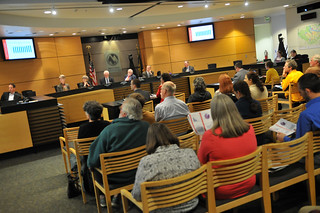
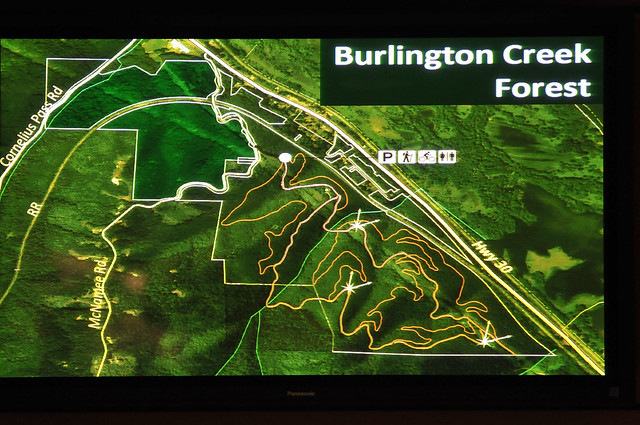
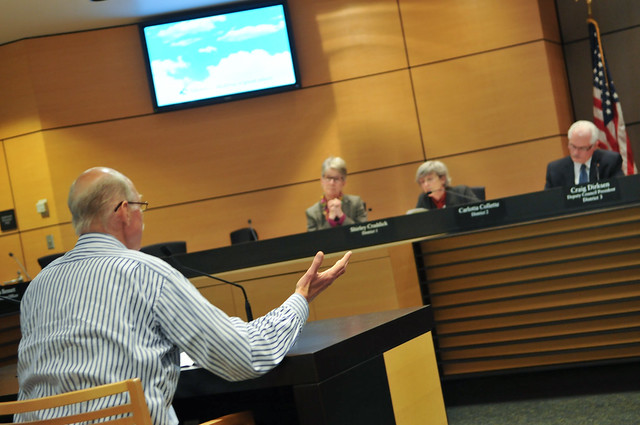
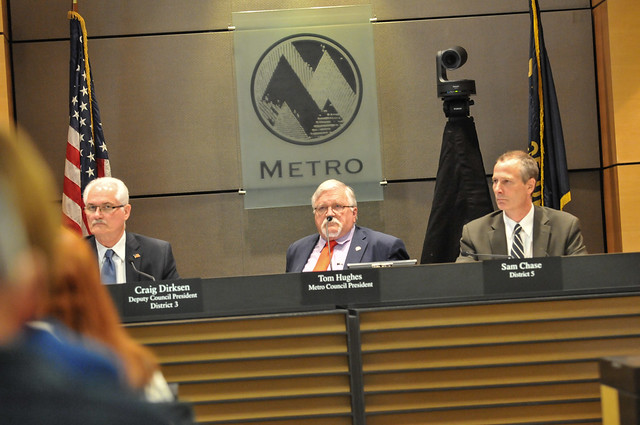
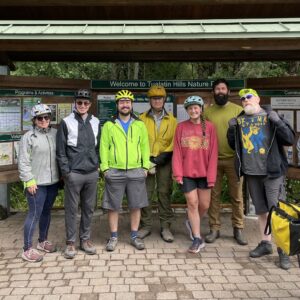
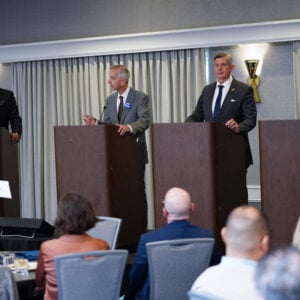
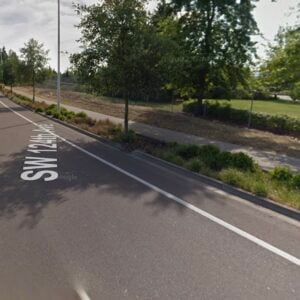

Thanks for reading.
BikePortland has served this community with independent community journalism since 2005. We rely on subscriptions from readers like you to survive. Your financial support is vital in keeping this valuable resource alive and well.
Please subscribe today to strengthen and expand our work.
If this plan goes forward will Metro post codes of conduct signs at trail entrances? I think all it takes sometimes is a little knowledge and consideration to make most outdoor activities enjoyable for everyone…
I’ve been on shared trails at Stub Stewart and Timothy Lake, and they seemed fine to me. Both locations had signs like that.
Calling for more studies is a classic opposition tactic. No matter how much data they are presented with and how many experts agree on something, they will always ask for more studies and argue that the studies were “flawed” or “biased”. Don’t give into the FUD.
And denying the data in the studies is another activist tactic. “I don’t like what it says, so I choose not to believe it.”
Thank you for covering this Jonathan! Your persistence and sleuthing has been an invaluable contribution to providing nature access for bikers. Thank you! We can all share and appreciate nature together!
If you haven’t already, I encourage everyone to watch the video of the meeting. Especially Science Manager Jonathan Soll’s testimony.
The most interesting section is when he talks about how he (as a scientist) would rather spend on monitoring vs. more studies on what is there.
I was amazed by the presentation. It is worth hearing. I learned more about the project than I thought I could, and the testimony regarding habitat and the overabundance of wildlife studies was good to hear. That presentation injected reason and sound scientific study into a vitriolic debate.
Great coverage on this, I’m always surprised how little love Mountain Biking gets in this town. Whats the latest word on River View by the way?
“Increased traffic could put families living on McNamee Road in increased danger by people not accustomed to driving on mountain roads”
You don’t live on the Karakorum highway ma’am.
One woman got up and said she had run off the road 3 times while driving, indicating that the road was windy, using it as justification to keep strangers away. How is that an argument? I almost shouted, “if you cant stay between the lines then slow down lady!
My thought was more like: “Maybe its time to put the hooch down…”
In regards to Elk. I can foresee this area becoming an Island as Cornelius Pass Rd. becomes more of a traffic corridor. It was only 30 years ago that that you would see Elk and Beaver as close to town as Cornell Rd and for sure Springville. That habitat is all houses now. Hillsboro’s growth plan is on a juggernaut course and the businesses, jobs, homes and traffic will fill that area.
“All of Mt. Hood?” See here in lies the problem, when these so called “environmentalists” block trail construction they forget about it almost immediately. How many years have we been waiting for the trails at Timberline to be built now? Every single place where mountain biking might be offered seems to be a precious snowflake to some NIMBY, who always say oh you can just build this somewhere else, but the somewhere else just comes with a new NIMBY often one who is emboldened by the success of the last NIMBY.
Mountain biking should only be done on real mountains! /sarcasm
Also, we have lost a lot of trails thanks to wilderness designations. If they want to support science, they should be supporting blocking equestrians from wilderness and allowing bicycles.
I for one, was relieved to find out that I can now ride my bike everywhere on Mt. Hood. Thanks, Hank!
Wait… can you be a NIMBY if the thing you don’t want isn’t anywhere near where you live?
This drives me nuts:
“Bikers already have all of Leif Erikson Road and Mt. Hood”…
As if we really did. Most of the trails in the Mt Hood National Forest are closed to bikes. And, even if they were open, would *hikers* would be satisfied with that: one old road to hike on and several trails in the National Forest 30 miles away?
–
I think it’s time we start talking about Trail Equality. It’s not a special right.
Exactly. I was thinking it would be like us proposing to close all of the single track in Forest Park to hikers for the next 35 years and have it only open to bikes. When hikers complain, we can say “You have all of Leif Erickson and you can drive to Mt. Hood.” I don’t think they would be satisfied – but I do think it would cut down on the amount of cars parked outside of Thurman gate!!
“And McNamee [the street she lives on] could get a lot more traffic and the increased traffic could put families living on McNamee Road in increased danger by people not accustomed to driving on mountain roads.”
I wonder where she thinks we currently drive to ride? With all the driving Portlanders do to get to the trailheads, I’m sure they have plenty of experience driving on mountain roads.
It’s like that bit I shared about lacrosse balls and cyclists earlier. It’s all nonsense. Just throwing whatever they can out there, in hopes that something sticks.
Cognitive dissonance is a requirement for NIMBYism.